Summary and Response Essay: Leadership Social Skills
VerifiedAdded on 2019/09/18
|6
|797
|404
Essay
AI Summary
This essay provides a summary and response to the topic of what makes a leader, focusing on the importance of social skills. It discusses emotional intelligence and its key component, social skills, emphasizing their role in achieving business success. The essay outlines various social skills such as maintaining eye contact, using body language effectively, communicating appropriately, fostering cooperation, accepting mistakes, and respecting peers. It concludes that great leaders are those who can motivate others and instill passion, highlighting the crucial role of social skills in leadership.
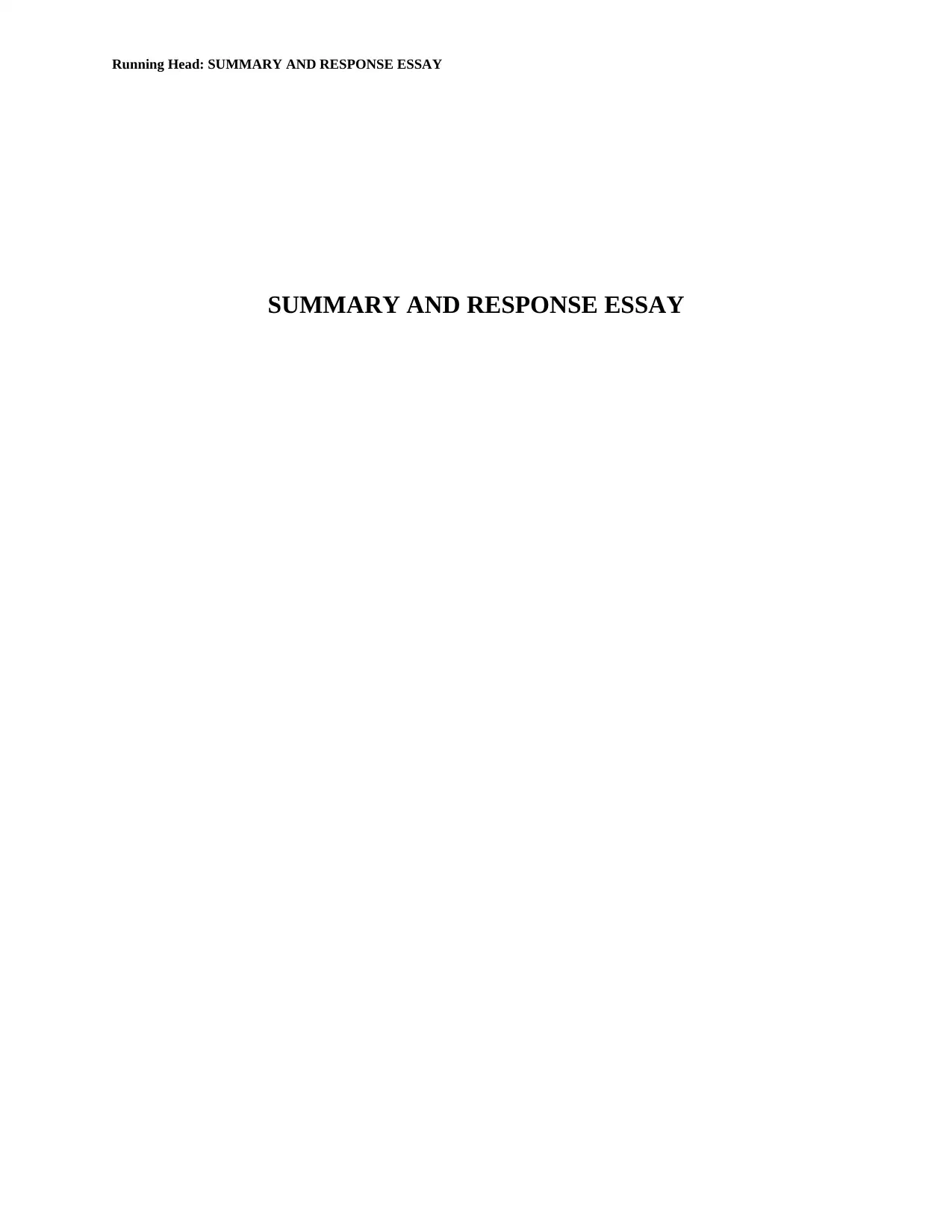
Running Head: SUMMARY AND RESPONSE ESSAY
SUMMARY AND RESPONSE ESSAY
SUMMARY AND RESPONSE ESSAY
Paraphrase This Document
Need a fresh take? Get an instant paraphrase of this document with our AI Paraphraser
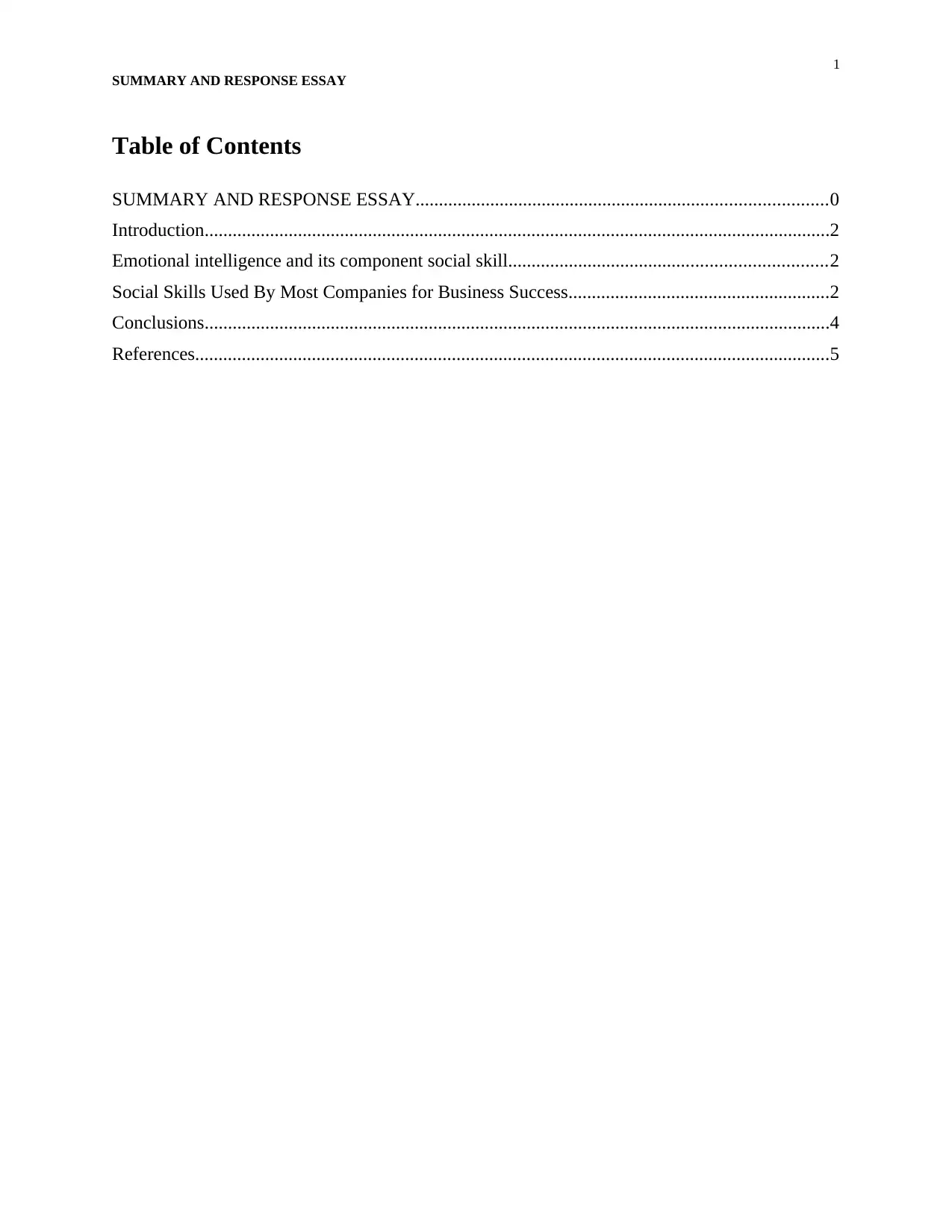
1
SUMMARY AND RESPONSE ESSAY
Table of Contents
SUMMARY AND RESPONSE ESSAY........................................................................................0
Introduction......................................................................................................................................2
Emotional intelligence and its component social skill....................................................................2
Social Skills Used By Most Companies for Business Success........................................................2
Conclusions......................................................................................................................................4
References........................................................................................................................................5
SUMMARY AND RESPONSE ESSAY
Table of Contents
SUMMARY AND RESPONSE ESSAY........................................................................................0
Introduction......................................................................................................................................2
Emotional intelligence and its component social skill....................................................................2
Social Skills Used By Most Companies for Business Success........................................................2
Conclusions......................................................................................................................................4
References........................................................................................................................................5
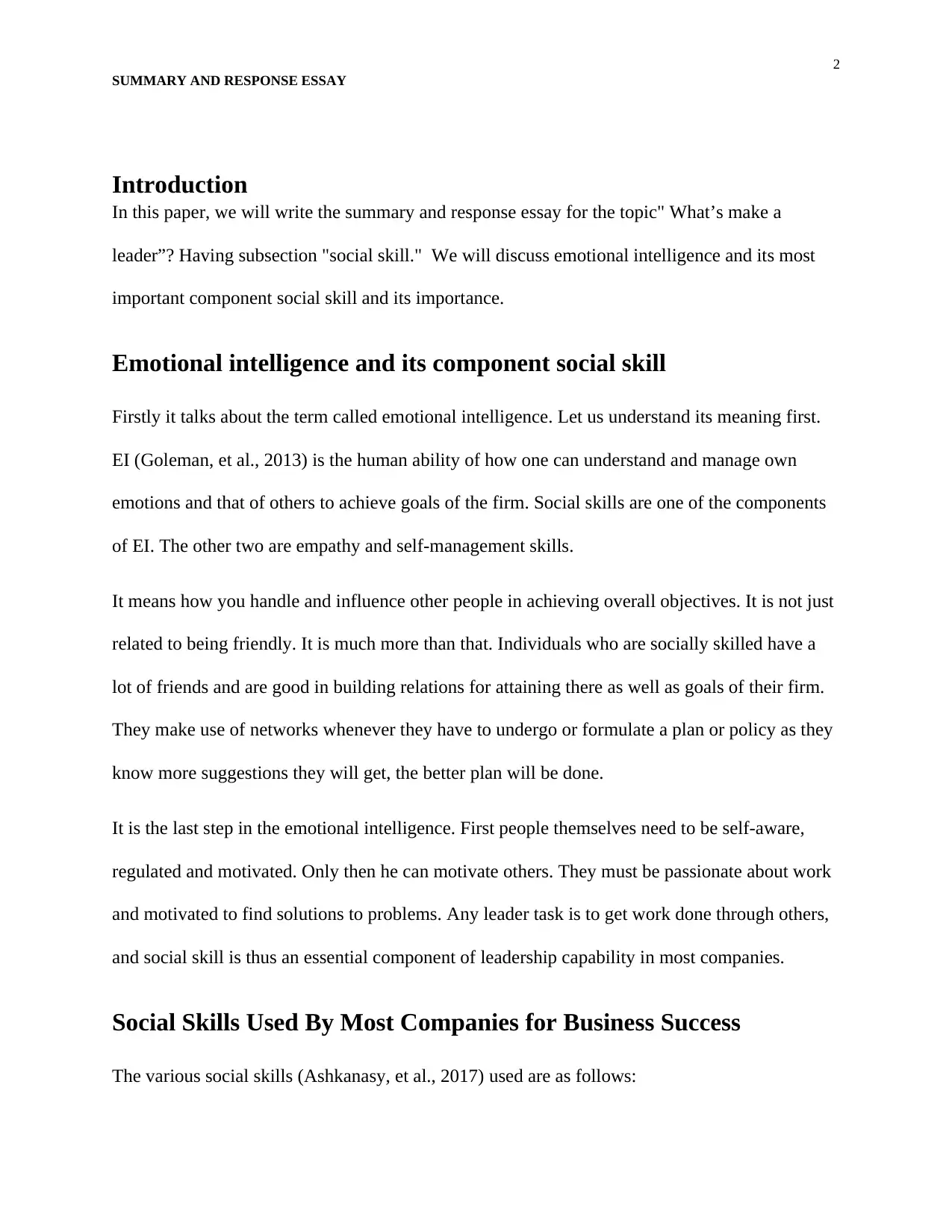
2
SUMMARY AND RESPONSE ESSAY
Introduction
In this paper, we will write the summary and response essay for the topic" What’s make a
leader”? Having subsection "social skill." We will discuss emotional intelligence and its most
important component social skill and its importance.
Emotional intelligence and its component social skill
Firstly it talks about the term called emotional intelligence. Let us understand its meaning first.
EI (Goleman, et al., 2013) is the human ability of how one can understand and manage own
emotions and that of others to achieve goals of the firm. Social skills are one of the components
of EI. The other two are empathy and self-management skills.
It means how you handle and influence other people in achieving overall objectives. It is not just
related to being friendly. It is much more than that. Individuals who are socially skilled have a
lot of friends and are good in building relations for attaining there as well as goals of their firm.
They make use of networks whenever they have to undergo or formulate a plan or policy as they
know more suggestions they will get, the better plan will be done.
It is the last step in the emotional intelligence. First people themselves need to be self-aware,
regulated and motivated. Only then he can motivate others. They must be passionate about work
and motivated to find solutions to problems. Any leader task is to get work done through others,
and social skill is thus an essential component of leadership capability in most companies.
Social Skills Used By Most Companies for Business Success
The various social skills (Ashkanasy, et al., 2017) used are as follows:
SUMMARY AND RESPONSE ESSAY
Introduction
In this paper, we will write the summary and response essay for the topic" What’s make a
leader”? Having subsection "social skill." We will discuss emotional intelligence and its most
important component social skill and its importance.
Emotional intelligence and its component social skill
Firstly it talks about the term called emotional intelligence. Let us understand its meaning first.
EI (Goleman, et al., 2013) is the human ability of how one can understand and manage own
emotions and that of others to achieve goals of the firm. Social skills are one of the components
of EI. The other two are empathy and self-management skills.
It means how you handle and influence other people in achieving overall objectives. It is not just
related to being friendly. It is much more than that. Individuals who are socially skilled have a
lot of friends and are good in building relations for attaining there as well as goals of their firm.
They make use of networks whenever they have to undergo or formulate a plan or policy as they
know more suggestions they will get, the better plan will be done.
It is the last step in the emotional intelligence. First people themselves need to be self-aware,
regulated and motivated. Only then he can motivate others. They must be passionate about work
and motivated to find solutions to problems. Any leader task is to get work done through others,
and social skill is thus an essential component of leadership capability in most companies.
Social Skills Used By Most Companies for Business Success
The various social skills (Ashkanasy, et al., 2017) used are as follows:
⊘ This is a preview!⊘
Do you want full access?
Subscribe today to unlock all pages.

Trusted by 1+ million students worldwide
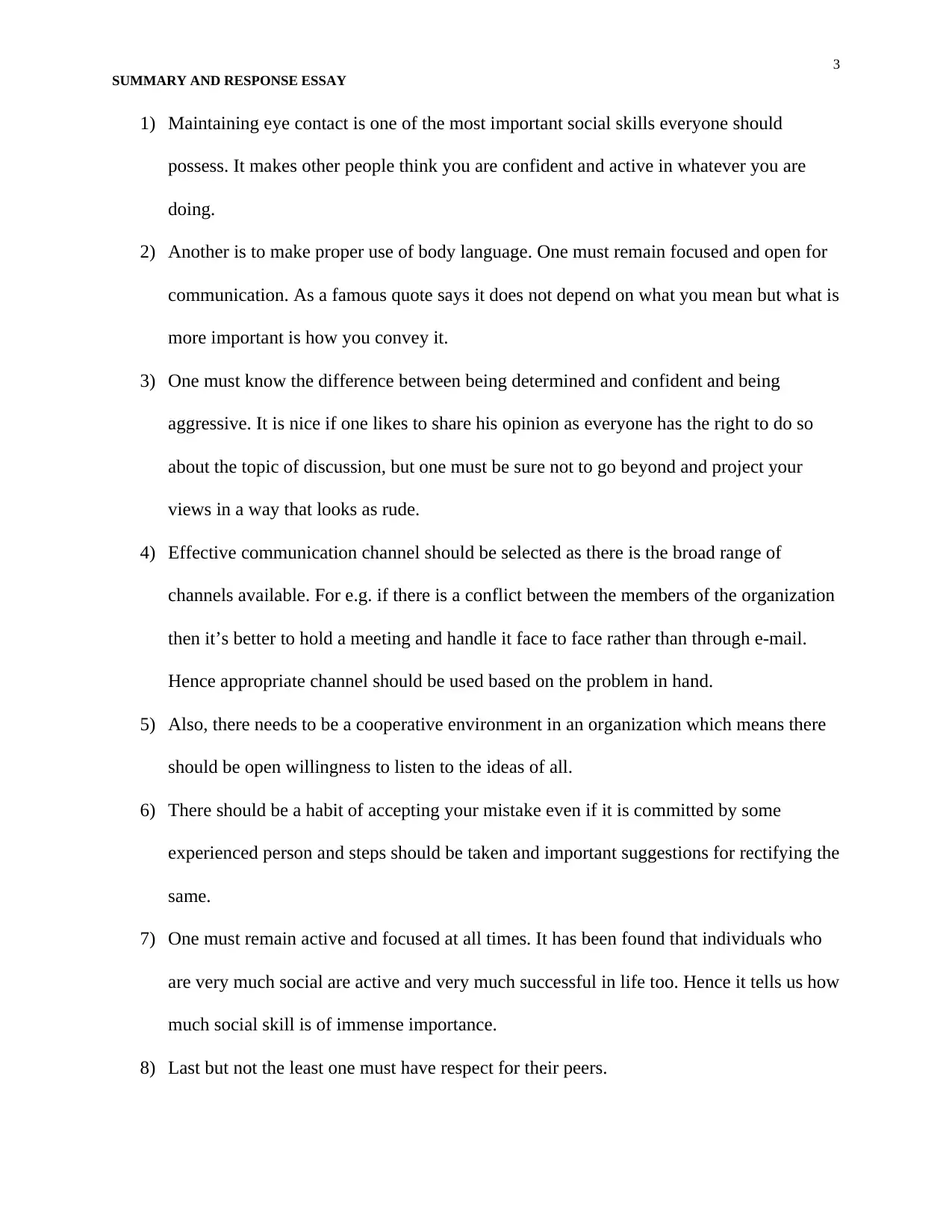
3
SUMMARY AND RESPONSE ESSAY
1) Maintaining eye contact is one of the most important social skills everyone should
possess. It makes other people think you are confident and active in whatever you are
doing.
2) Another is to make proper use of body language. One must remain focused and open for
communication. As a famous quote says it does not depend on what you mean but what is
more important is how you convey it.
3) One must know the difference between being determined and confident and being
aggressive. It is nice if one likes to share his opinion as everyone has the right to do so
about the topic of discussion, but one must be sure not to go beyond and project your
views in a way that looks as rude.
4) Effective communication channel should be selected as there is the broad range of
channels available. For e.g. if there is a conflict between the members of the organization
then it’s better to hold a meeting and handle it face to face rather than through e-mail.
Hence appropriate channel should be used based on the problem in hand.
5) Also, there needs to be a cooperative environment in an organization which means there
should be open willingness to listen to the ideas of all.
6) There should be a habit of accepting your mistake even if it is committed by some
experienced person and steps should be taken and important suggestions for rectifying the
same.
7) One must remain active and focused at all times. It has been found that individuals who
are very much social are active and very much successful in life too. Hence it tells us how
much social skill is of immense importance.
8) Last but not the least one must have respect for their peers.
SUMMARY AND RESPONSE ESSAY
1) Maintaining eye contact is one of the most important social skills everyone should
possess. It makes other people think you are confident and active in whatever you are
doing.
2) Another is to make proper use of body language. One must remain focused and open for
communication. As a famous quote says it does not depend on what you mean but what is
more important is how you convey it.
3) One must know the difference between being determined and confident and being
aggressive. It is nice if one likes to share his opinion as everyone has the right to do so
about the topic of discussion, but one must be sure not to go beyond and project your
views in a way that looks as rude.
4) Effective communication channel should be selected as there is the broad range of
channels available. For e.g. if there is a conflict between the members of the organization
then it’s better to hold a meeting and handle it face to face rather than through e-mail.
Hence appropriate channel should be used based on the problem in hand.
5) Also, there needs to be a cooperative environment in an organization which means there
should be open willingness to listen to the ideas of all.
6) There should be a habit of accepting your mistake even if it is committed by some
experienced person and steps should be taken and important suggestions for rectifying the
same.
7) One must remain active and focused at all times. It has been found that individuals who
are very much social are active and very much successful in life too. Hence it tells us how
much social skill is of immense importance.
8) Last but not the least one must have respect for their peers.
Paraphrase This Document
Need a fresh take? Get an instant paraphrase of this document with our AI Paraphraser

4
SUMMARY AND RESPONSE ESSAY
Conclusions
To conclude we can say that great leaders are those who not only can do the work by themselves
and are confident and motivated enough but who can make others work according to them and
can instill in them a sense of passion towards work. For that social skill is of utmost importance.
SUMMARY AND RESPONSE ESSAY
Conclusions
To conclude we can say that great leaders are those who not only can do the work by themselves
and are confident and motivated enough but who can make others work according to them and
can instill in them a sense of passion towards work. For that social skill is of utmost importance.
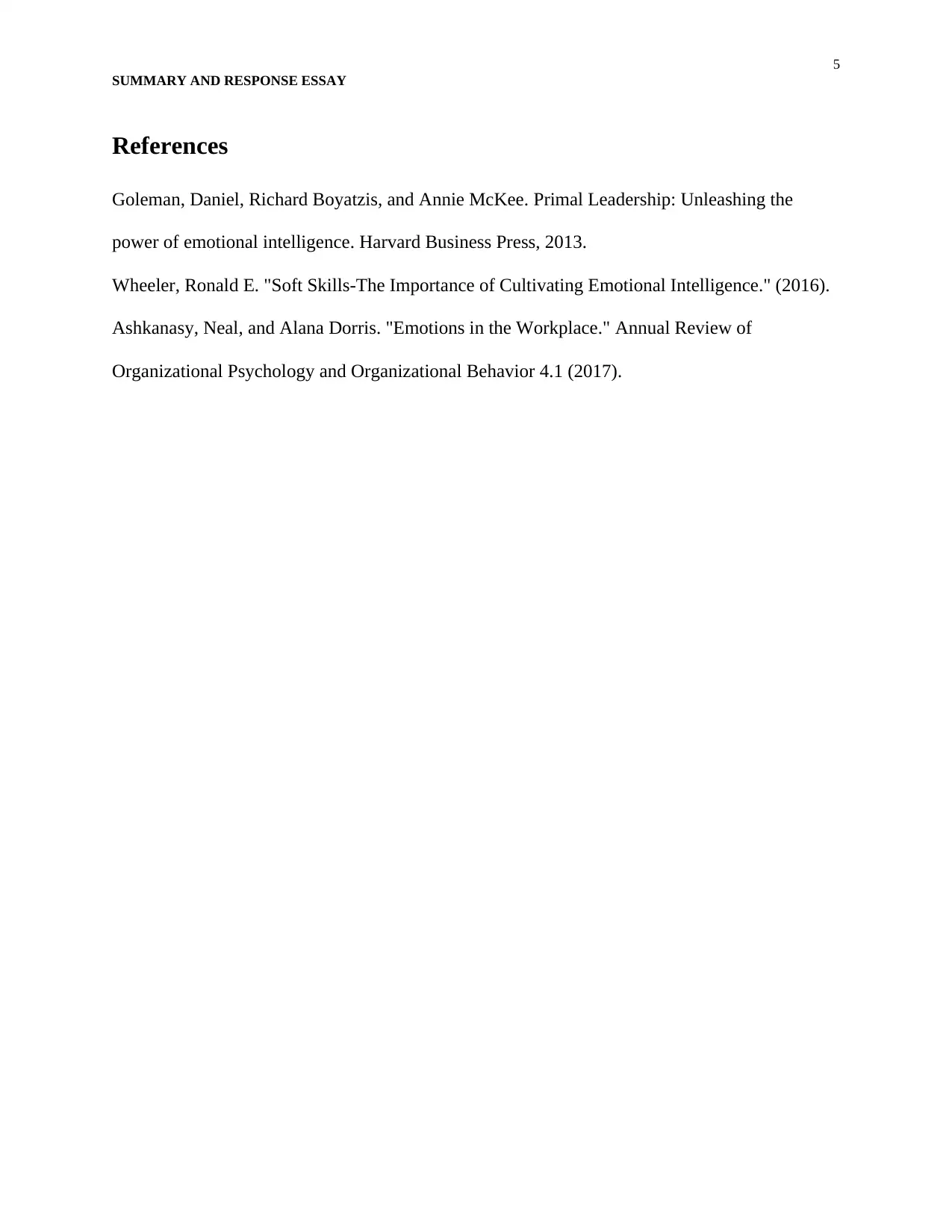
5
SUMMARY AND RESPONSE ESSAY
References
Goleman, Daniel, Richard Boyatzis, and Annie McKee. Primal Leadership: Unleashing the
power of emotional intelligence. Harvard Business Press, 2013.
Wheeler, Ronald E. "Soft Skills-The Importance of Cultivating Emotional Intelligence." (2016).
Ashkanasy, Neal, and Alana Dorris. "Emotions in the Workplace." Annual Review of
Organizational Psychology and Organizational Behavior 4.1 (2017).
SUMMARY AND RESPONSE ESSAY
References
Goleman, Daniel, Richard Boyatzis, and Annie McKee. Primal Leadership: Unleashing the
power of emotional intelligence. Harvard Business Press, 2013.
Wheeler, Ronald E. "Soft Skills-The Importance of Cultivating Emotional Intelligence." (2016).
Ashkanasy, Neal, and Alana Dorris. "Emotions in the Workplace." Annual Review of
Organizational Psychology and Organizational Behavior 4.1 (2017).
⊘ This is a preview!⊘
Do you want full access?
Subscribe today to unlock all pages.

Trusted by 1+ million students worldwide
1 out of 6
Related Documents
Your All-in-One AI-Powered Toolkit for Academic Success.
+13062052269
info@desklib.com
Available 24*7 on WhatsApp / Email
![[object Object]](/_next/static/media/star-bottom.7253800d.svg)
Unlock your academic potential
Copyright © 2020–2026 A2Z Services. All Rights Reserved. Developed and managed by ZUCOL.




